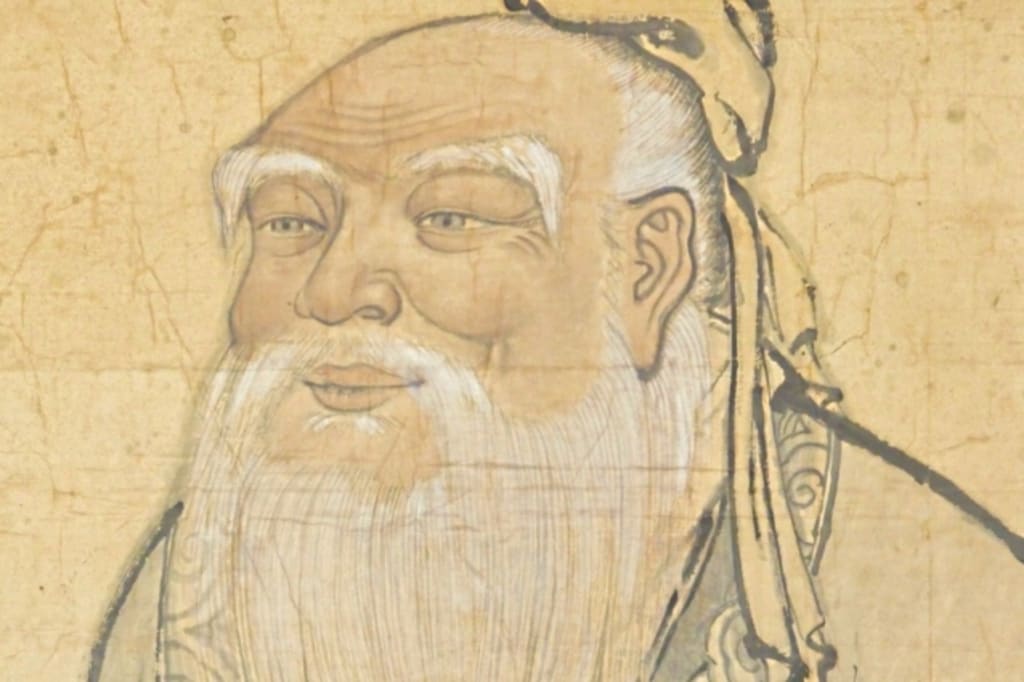
With young people returning to school and some parents feeling perhaps as if some burden has been relieved, I thought it would be interesting to consider the educational system and objectives of another time and place.
Educational Rudiments
The factual content presented herein is drawn from The Wisdom of Confucius, a work of translation by Lin Yutang, which is based on material from the Analects, and on The Life of Confucius, by Szema Ch’ien, a historian of comparable importance to Josephus, with additional support from the World Book Encyclopedia.
The name Confucius, 551–479 BC, evolved from the title and name K’ung Ch’iu, which translates into Master Kong. During his years, in the turmoil and transformation that was China, every young man was required to undergo six branches of study… ritual, music, archery, carriage driving, writing, and mathematics.
Although he has often been presented as such, Confucius was not really motivated to understand spiritual awareness in a profound way or the morals that come with it. He did not try to interpret things in terms of right and wrong or in measures of goodwill or malice. He looked for simple, commonsensical truths in the interactions of people with each other or people and the environment, in observations of causation, and in the natural reciprocations and consequences of the everyday world.
By the time of his passing, his school of thought, that is, his way of thinking and his way of teaching it, had become the national curriculum. People were actually teaching and studying what he considered important, utilizing his methodology in teaching and his observations and assertions in learning.
It was other people who looked for "the right thing to do," not for the sake of a sense of righteousness but for the sake of maintaining cordial and purposeful relations. Right and wrong had to do with what it takes for a person to be taken seriously, so that the business of the day can be carried out without resorting to authoritative measures or force or violence.
Confucius would glean out the logical and practical answers from the obvious… what was obvious to him. And in all matters of life and business, he held that ritual and music contained the necessary elements for civil discussions and political appeasements.
Amidst the issues of frequent changes in rulership, changes in boundary lines, inexperienced governors and district managers, and the need to prevent chaos, contain the people, and keep order… when asked by a student how one would govern wisely, the Master replied, “… all one needs is to fully understand ritual and music and then apply them to the government.”
In his time of teaching, China was divided into states, counties, towns, and hamlets. In every hamlet of at least 25 families, a primary school was provided. Presumably, if children from smaller hamlets or more rural environs were to seek education, they would have had to commute and/or board somewhere, and it is conceivable that many would have been left behind in the educational stream.
In every town of at least 500 families, a secondary school was provided in addition to the primary one. And in every county of 2500 families, an academy was also provided. Every state capital hosted a college, these being mainly for princes, nobles, and those from the lower classes who may have shown particular excellence.
Every year, new students would be enrolled in the primary schools. Every other year, there would be an examination to test for grammatical and math skills, as well as natural inclinations. The emphasis was on the males, but if a girl showed potential, she would certainly be encouraged to participate and escalate in the program.
Every three years, students would be polled and tested to review their habits of study and their group life adaptations. And every five years, similar polls and tests would determine their literary competences and their commitments to their teachers.
Every seven years, students were tested in the development of their ideology and polled as to their circles of friends. If someone’s profile satisfied the perceptions of the establishment, this would be their Minor Graduation (from the lower grades).
At the end of nine years, if students could demonstrate acceptable knowledge of all the various subjects, a general understanding of life, and if they could show firm foundations of character, from which they could not go back, they would attain Major Graduation.
This system of education was developed by the ruling factions and imposed on the populace, with the rationale that it made possible the cultivation of the people and the reformation of national morals. In other words, it was believed by the rulers and administrators that it kept the people happy and made the country visitor-friendly.
Fundamental Rationale

Carriage Driving
Those who went to college learned the proper usage of ceremonial robes and vegetable offerings at sacrifices in order to learn the principles of piety. They were made to sing important and traditional songs in order to learn the first elements of official life.
In that part of China where Confucius traveled, the states were constantly shifting boundaries. Clans of nobles feuded continually, with different rulers emerging frequently. Rulers needed to know how to delegate positions effectively to their underlings, and the underlings needed to know how to maintain order and civility among newly subjugated citizens.
The newly subjugated citizens needed to know how to be orderly and compliant, so as to avoid punishments. Such was the background into which Confucius was born and out of which he had to make sense and then justify it or at least explain it in such a way that everybody could learn to live with it.
There was no religion, just the simple beliefs and superstitions that people clung to out of fear or based on things they saw or heard. The authorities tolerated spiritual beliefs to the extent that they did not become troublesome. And so, most of the aforementioned "piety" was projected towards the venerable authorities.
After the exams that were given every other year in the primary grades, where students were checked for their natural inclinations, students would then be guided to pursue the talents they exhibited.
In the five-year tests, students’ commitments to their teachers were checked, and then they might be matched up with the teachers from whom they learned best. The teachers were directed by the higher echelons to instill the values and ideals of the state.
In the seven-year exams, young men were checked to determine what sorts of ideas they might be having and what kinds of social circles might be developing. When developing minds were seen to be formulating doubts about the state, they had to be set straight. And when such thinking formed into groups, such groups had to be disbanded and discouraged.
The "firm foundation of character" required to attain Major Graduation meant that a young person was already expressing a belief in and a commitment to the state. He or she could now choose to learn the pietistic rituals and the "songs of the state" and serve in diplomatic or political roles, or they could serve in the military.
The philosophy of Confucius, which became widespread in the academic halls of his time and continued to be so long after his death, was one of pragmatism in the everyday world, yet its simplicity and its adherence to the truth has often overlapped it with spiritual and religious concepts.
The student asked, “How may one serve the spirits and the gods?”
The Master replied, “You are not yet able to serve men, how could you serve the spirits?”
The student asked, “May I ask you about death?”
The Master replied, “You do not yet know life, how could you know death?”
The student asked, “Is there one single word that can serve as a principle of conduct for life?”
Confucius replied, “Perhaps the word ‘shu’ (reciprocity) will do. Do not do unto others what you do not want others to do unto you.”
r. nuñez, 9/2013
About the Creator
r. nuñez
I am a shamanic priest who loves to write stories, poetry, and songs. Retired, but still helping people, animals, and the planet.






Comments
There are no comments for this story
Be the first to respond and start the conversation.